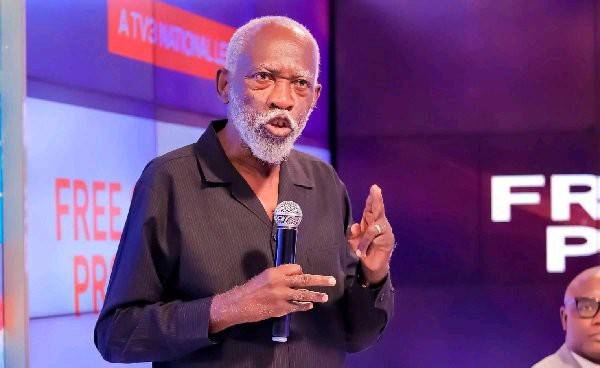In a recent critique, Professor Stephen Adei, former Rector of the Ghana Institute of Management and Public Administration (GIMPA), expressed his dissatisfaction with Speaker of Parliament Alban Bagbin’s remarks regarding the Judiciary and Executive’s role in the legislative process. Prof. Adei voiced concern over Bagbin’s decision to hold a press conference accusing both the Judiciary and the Executive of undermining Parliament's authority, instead of defending his position in court.
This controversy emerged after Speaker Bagbin publicly raised concerns over perceived interference from other branches of government. Bagbin alleged that the Judiciary and Executive were overstepping their boundaries, compromising Parliament's independence and integrity. He warned of what he described as a “growing power struggle†between the arms of government, which he claimed was jeopardizing the stability and effectiveness of the legislative branch.
However, Prof. Adei, speaking on JoyNews, argued that the Speaker’s approach to the issue was misguided. “I will not mince any words,†he remarked. “I think the Speaker shouldn’t have made that statement at all. This is not an issue of collision. He refused to go and defend himself when there is a case.†For Prof. Adei, the Speaker’s failure to appear in court or file the required legal processes undermined his position and invalidated his right to later address the public in a press conference. According to Adei, “Any Ghanaian who has a case in any court, let alone the Supreme Court, and says they will not defend their case, has no right to make press conferences.â€
In Adei’s view, Speaker Bagbin’s actions have led the Supreme Court to treat him with leniency. He noted that in many instances, failing to appear in court or submit requested documents might lead to contempt charges for ordinary citizens. “In fact, the Supreme Court is just playing kid gloves with him,†Prof. Adei stated, “because if it were me or you, we could be in jail for contempt of court.†This statement hints at what he perceives as preferential treatment or leniency extended to individuals in powerful positions, which he suggests might compromise the credibility of the judicial process.
Prof. Adei further advised that Speaker Bagbin should respect the current legal framework and abide by the recent Supreme Court ruling that declared his decision to declare certain parliamentary seats vacant as unconstitutional. According to Prof. Adei, the best course of action would be to reconvene Parliament, especially given that it is currently adjourned, and uphold the status quo for the remaining weeks until the session ends on January 7. He reasoned that this would align with the Supreme Court’s directive and prevent any further conflict between Parliament and the Judiciary. “The most straightforward solution would be to recall Parliament, maintain the status quo for the remaining weeks, and allow the legislative body to fulfil its duties until the session’s end,†he noted.
The apex court’s ruling stemmed from a case involving Speaker Bagbin’s unilateral decision to declare four parliamentary seats vacant. This move was met with legal challenges, and ultimately, the Supreme Court ruled that the Speaker’s actions were unconstitutional. The court’s decision highlights the delicate balance of power between the branches of government and underscores the Judiciary’s role in maintaining this equilibrium. However, Bagbin’s response—or lack thereof—has fueled further criticism.
Both Bagbin and his legal team, represented by Thaddeus Sory, failed to attend a scheduled court appearance to argue the case. Additionally, the Speaker’s counsel did not submit the necessary legal documentation, which the court had previously ordered. Prof. Adei’s criticism points to these lapses as evidence of Bagbin’s disregard for due process, arguing that by not participating in the judicial proceedings, the Speaker undermined his own authority to later publicly question the actions of the Judiciary.
The relationship between Ghana’s three branches of government—Executive, Judiciary, and Legislature—has always required careful navigation to avoid power imbalances. Speaker Bagbin’s accusations of interference suggest that he views the Judiciary’s recent actions as encroachments upon Parliament’s autonomy. Nevertheless, Prof. Adei’s comments highlight a contrasting viewpoint that stresses adherence to legal processes and cooperation between branches as essential to maintaining a functional democracy.
For the Ghanaian public, this situation presents a complex issue. On one hand, some may sympathize with Speaker Bagbin’s stance, particularly if they share concerns about judicial or executive overreach. Others, however, might align with Prof. Adei’s view that respect for legal processes is paramount, especially for individuals in high-ranking positions who serve as examples for the nation. The broader implications of this dispute may influence public opinion on the independence of the Judiciary and the potential consequences for those who choose not to comply with judicial rulings.
As Parliament’s January session closure approaches, it remains uncertain whether Speaker Bagbin will follow Prof. Adei’s recommendation to reconvene Parliament and uphold the status quo. For many observers, the Speaker’s next steps could either reinforce his commitment to legislative independence or suggest a willingness to cooperate with the Judiciary, thus easing current tensions. Meanwhile, Prof. Adei’s remarks contribute to a growing discourse on accountability and the responsibilities of public officeholders to respect the country’s legal and judicial systems.
This ongoing saga may serve as a case study on governance and the importance of checks and balances within Ghana’s democratic framework. By choosing to either persist in his current approach or shift towards a more reconciliatory stance, Speaker Bagbin’s response could significantly influence Ghana’s political landscape and shape public expectations of government officials’ accountability in the face of judicial directives. As Prof. Adei’s criticisms suggest, the situation has sparked discussions that go beyond individual personalities, touching on the very principles that underpin the nation’s democratic institutions.


